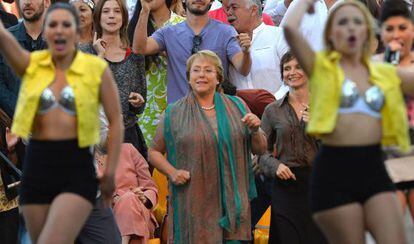Chile’s most polarized election campaign since Pinochet comes to a close
This Sunday's polls will define the future development model of the country

Chile's presidential campaign, which ended Thursday, was perhaps the most predictable of recent years, given Sunday's near-certain victory of Michelle Bachelet, a Socialist who already led the country from 2006 to 2010. But it was also the most polarized run for office since the 1988 plebiscite that led dictator Augusto Pinochet to step down two years later.
Since the triumph of the dictatorship's opponents, Chile has experienced a political cycle in which democracy has taken hold, poverty targets have been reached, and social policies such as judicial and health reform have been undertaken. Following the social protests of 2011, however, there has been a debate regarding the development model that the nation needs for the future, and the nine candidates trying to get the keys to La Moneda palace on March 11 have differing visions on this issue.
For the first time since the plebiscite, a presidential campaign's political agenda was strongly marked by initiatives such as changing the Constitution, overhauling the tax system, offering free education and even re-nationalizing the copper industry, among other things. One sentence keeps cropping up in analysts' reviews: “Chile has changed cycles,” and this was reflected in the recently ended campaign.
After 20 years, a profound debate has begun regarding the model and the ideas for change"
“After 20 years, a profound debate has begun regarding the model and the ideas for change. There is something of this notion in the last speech made by the right: the future of the country is at stake,” notes the columnist Andrés Benítez, president of Adolfo Ibáñez University.
The run for office was not a tough one in terms of confrontation. Aware that she was the favorite in the opinion polls, with a comfortable 47-percent level of support, Bachelet avoided going on the attack in her last televised debates. Instead, the former chief of the UN Women agency has tried to maintain her aura of an international leader, even though a week ago her team accused La Moneda of 100 cases of interventionist policies.
It was the National Renewal nominee, Evelyn Matthei, who raised the tone of the discussion. In a bid to improve her results this Sunday (the polls give her 14-percent support) and force a second round of voting, the candidate for the ruling party attacked Bachelet over the cost of her campaign. Matthei also reported that Franco Parisi, an entrepreneur with populist rhetoric who enjoys 10-percent support in the opinion polls, owes money to the employees who work at his schools.
“There is a difference between the verbal conflicts and ideological radicalization,” says Eugenio Guzmán, dean of the School of Governance at Development University. “The 1999 campaign between Ricardo Lagos and Joaquín Lavín had more confrontation, but less ideology.”
For David Gallagher, an analyst at the Center for Public Studies, there are several causes for the polarization of this campaign. One is the student protests of 2011. Another is the observance of the 40th anniversary of the military coup in September, which led to a discussion of the Pinochet era and had President Sebastián Piñera state that there were “passive accomplices” during the dictatorship.
“The word neoliberal has been viewed negatively in Chile for a long time […], but whether that means that a government is going to change the model, well I'm not so sure. Bachelet is a pragmatic woman,” he adds.
The notion of profound changes to the system did not show up in the campaigns of 1993, 1999, 2005 or 2009. Now that it has, it is when the center-left has lost power after a 20-year rule, and following some deep soul-searching when the center-right Piñera won the 2010 elections. “On the one hand there's Bachelet and a few anti-system candidates, and on the other there's Evelyn Matthei making a defense of the development model,” says the analyst Max Colodro.
Some observers feel that the tone of the campaign was further polarized when the conservative candidate, Laurence Golborne – a former Minister of Mining who led the rescue of 33 miners in 2010 – was forced to resign following a public scandal involving his concealment of a company headquartered in the Virgin Islands.











































